Main navigation
Search Results
-
-
The AlbLavendel project - 20/11/2023 
Swabian lavender cultivation: aesthetic and sustainable
Blue-violet, fragrant fields like those in Provence may soon become a common sight in the Swabian Alb. As part of the AlbLavendel project, the University of Hohenheim along with the company naturamus GmbH and the German Institutes of Textile and Fibre Research Denkendorf has started to investigate the cultivation of lavender, the production of essential oils and the use of distillation residues for producing textile fibres in the local region.
https://www.biooekonomie-bw.de/en/articles/news/swabian-lavender-cultivation-aesthetic-and-sustainable -
Press release - 15/11/2023 Nanoparticles for optimized cancer therapy
Pancreatic cancer is one of the deadliest types of cancers in humans. Chemotherapies attack not only the tumor cells but also healthy cells throughout the body. Innovative nanoparticles could be a new approach to treat cancer more precisely. The approach was developed by a research team from the Max Planck Institute (MPI) for Multidisciplinary Sciences, the University Medical Center Göttingen (UMG), and the Karlsruhe Institute of Technology.
https://www.gesundheitsindustrie-bw.de/en/article/press-release/nanopartikel-fuer-optimierte-krebstherapie -
Augmented reality for visual orientation - 15/11/2023 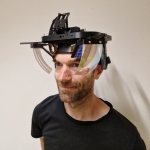
Fall prevention with the help of balance-enhancing AR glasses
As we age, our eyesight deteriorates and we have increasing difficulties with orientation. This can lead to balance problems and fatal falls. A team led by Dr. Lorenz Assländer from the University of Konstanz is currently developing a prototype of augmented reality (AR) glasses that use superimposed patterns to facilitate visual orientation in space, thereby helping to improve balance control and prevent falls.
https://www.gesundheitsindustrie-bw.de/en/article/news/fall-prevention-help-balance-enhancing-ar-glasses -
Event - Sharing Knowledge about: Insect Biorefineries and AI Tools
Online, Informationsveranstaltunghttps://www.biooekonomie-bw.de/en/events/sharing-knowledge-about-insect-biorefineries-and-ai-tools -
Press release - 10/11/2023 Therapy resistance in multiple myeloma: molecular analyses of individual cancer cells reveal new mechanisms
All cancer cells - even those within the same tumor - differ from each other and change over the course of a cancer disease. Scientists at Heidelberg University Hospital, the Medical Faculty in Heidelberg and the German Cancer Research Center discovered molecular changes in multiple myeloma that help individual cancer cells to survive therapy.
https://www.gesundheitsindustrie-bw.de/en/article/press-release/therapy-resistance-multiple-myeloma-molecular-analyses-individual-cancer-cells-reveal-new-mechanisms -
Nanoparticles as drug carriers - 09/11/2023 
Inhalation of nanocarriers for antibiotics against resistant tuberculosis pathogens
Around ten million people worldwide still contract tuberculosis every year. With an estimated 1.4 million deaths a year, tuberculosis was the world’s deadliest infectious disease until COVID-19. The high mortality rate is down to the sophisticated biology of the pathogen Mycobacterium tuberculosis. A team of researchers from the KIT and the Research Centre Borstel (FZB) has developed a method that aims to outsmart the bacterium once and for all.
https://www.gesundheitsindustrie-bw.de/en/article/news/inhalation-nanocarriers-antibiotics-against-resistant-tuberculosis-pathogens -
Climate-neutral wastewater treatment plants thanks to patented real-time analytics - 08/11/2023 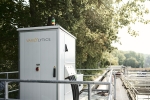
Using AI to reduce greenhouse gases in wastewater companies
The wastewater industry is responsible for global greenhouse gas emissions equivalent to those of global aviation. The start-up Variolytics has found a way to significantly reduce greenhouse gases in wastewater treatment plants using real-time analytics. The patented sensor technology and AI-supported process optimisation offer multiple benefits: in addition to reducing nitrous oxide, the system helps to reduce energy costs and resources.
https://www.biooekonomie-bw.de/en/articles/news/using-ai-reduce-greenhouse-gases-wastewater-companies -
Press release - 06/11/2023 Improving the efficacy of cancer immunotherapy with modified CAR-T cells
CAR-T cell therapy is a last hope for many patients with blood, bone marrow or lymph gland cancer when other treatments are unsuccessful. A limiting factor of this very effective and safe therapy is that the cells used in the process quickly reach a state of exhaustion. Researchers at the University of Freiburg have now been able to prevent this exhaustion and thus significantly improve the effect of the therapy in a preclinical animal model.
https://www.gesundheitsindustrie-bw.de/en/article/press-release/improving-efficacy-cancer-immunotherapy-modified-car-t-cells -
Press release - 02/11/2023 Sustainability Innovation Campus
The Sustainability Innovation Campus (ICN) initiated by the University of Freiburg and the Karlsruhe Institute of Technology (KIT), which will begin its work in January 2024, has announced a two-year funding programme for start-up projects. Scientists from the University of Freiburg, KIT and cooperating universities and research institutions are invited to submit their project outlines by 30 November 2023.
https://www.biooekonomie-bw.de/en/articles/pm/sustainability-innovation-campus -
-
Wasser 3.0: #detect|remove|reuse - 31/10/2023 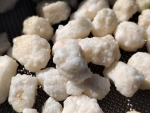
How to sustainably remove and recycle microplastics from water
We all pollute our water with things we use in our everyday lives. In the process, microplastics and micropollutants accumulate in sometimes significant quantities and are difficult to remove. This has increasingly devastating consequences for our health and the environment. Wasser 3.0, a non-profit start-up from Karlsruhe, has declared war on this problem by developing a customisable process to detect, remove and even recycle these pollutants.
https://www.biooekonomie-bw.de/en/articles/news/how-sustainably-remove-and-recycle-microplastics-water -
Press release - 30/10/2023 New research group: construction of tissue in laboratory
An interdisciplinary research group combining mechanical engineering and biotechnology has taken up its work at the Institute for Molecular Systems Engineering and Advanced Materials (IMSEAM) of Heidelberg University. The team under the direction of Dr Kai Melde will pursue an innovative approach to biofabrication – 3D cell culture using ultrasound. Tools are being developed that can be used as an alternative to or enhancement for 3D printing.
https://www.gesundheitsindustrie-bw.de/en/article/press-release/neue-forschungsgruppe-konstruktion-von-gewebe-im-labor -
Press release - 27/10/2023 Lignin coating makes Geotextiles made from environmentally friendly natural fibers durable
Textiles are a given in civil engineering. Until now, textiles made of resistant synthetic fibers have been used for this purpose, having a long lifetime. For some applications, however, it would not only be sufficient but even desirable for the auxiliary textile to degrade when it has done its job. Natural fibers, in contrast, often decompose too quickly. The DITF are developing a bio-based protective coating that extends their service life.
https://www.biooekonomie-bw.de/en/articles/pm/lignin-coating-makes-geotextiles-made-environmentally-friendly-natural-fibers-durable -
High-resolution microscopy technology bypassing the diffraction limit - 26/10/2023 
From micro- to nanoscope
It has long been impossible to distinguish objects closer than 200 nanometres using light microscopes. However, novel devices developed by a company called abberior Instruments GmbH, which use technology developed by Nobel Prize winner Prof. Dr. Stefan Hell and his teams in Heidelberg and Göttingen, are now able to bypass this resolution limit and provide detailed insights into living cells in the lower nanometre range.
https://www.gesundheitsindustrie-bw.de/en/article/news/micro-nanoscope -
Press release - 26/10/2023 Innovative research aims to improve wound healing and cancer therapy
Jun.-Prof. Dr. Priscilla Briquez, junior professor at the Department of General and Visceral Surgery at the Freiburg University Medical Center and member of the Medical Faculty at the University of Freiburg, has received a European Research Council (ERC) Starting Grant from the European Commission. Her DRESSCODE project will receive a total of 1.5 million euros funding for five years.
https://www.gesundheitsindustrie-bw.de/en/article/press-release/innovative-forschung-soll-wundheilung-und-krebstherapie-verbessern -
Press release - 25/10/2023 Epigenetically acting drugs could support cancer immunotherapy
Epigenetically active drugs enable the cell to read parts of the genome that were previously blocked and inaccessible. This leads to the formation of new mRNA transcripts and also new proteins, as scientists from the German Cancer Research Center and the University Hospital Tübingen have now published. These "therapy-induced epitopes" could help the immune system recognize cancer cells.
https://www.gesundheitsindustrie-bw.de/en/article/press-release/epigenetically-acting-drugs-could-support-cancer-immunotherapy -
Press release - 25/10/2023 Epigenetically acting drugs could support cancer immunotherapy
Epigenetically active drugs enable the cell to read parts of the genome that were previously blocked and inaccessible. This leads to the formation of new mRNA transcripts and also new proteins, as scientists from the German Cancer Research Center and the University Hospital Tübingen have now published. These "therapy-induced epitopes" could help the immune system recognize cancer cells.
https://www.gesundheitsindustrie-bw.de/en/article/press-release/epigenetisch-wirkende-medikamente-koennten-krebs-immuntherapie-unterstuetzen -
Press release - 20/10/2023 Why tuberculosis bacteria form long chains
A researcher team from Ecole Polytechnique Federal de Lausanne led by Dr. Vivek Thacker now group leader at the Department of Infectious Diseases at Heidelberg University Hospital have studied why tuberculosis bacteria form long strands and how this affects their infectivity. Their findings could lead to new therapies and have now been published in the journal Cell.
https://www.gesundheitsindustrie-bw.de/en/article/press-release/why-tuberculosis-bacteria-form-long-chains -
Press release - 18/10/2023 SARS-CoV-2: Alert immune system in the respiratory tract protects children from severe courses of the disease
Why are severe courses of SARS-CoV-2 infection less common in children and adolescents than in adults? Scientists at the German Cancer Research Center (Deutsches Krebsforschungszentrum, DKFZ) have now discovered that the immune system in the upper respiratory tract is much more alert and active in children before infection than in adults and is therefore better equipped to fight the virus.
https://www.gesundheitsindustrie-bw.de/en/article/press-release/sars-cov-2-aktiveres-immunsystem-den-atemwegen-schuetzt-kinder-vor-schweren-verlaeufen -
Microorganisms degrade biobased turf infill - 17/10/2023 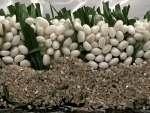
Eco-friendly artificial turf: a sports pitch that’s good for people and the environment
There are thousands of artificial turf pitches in Germany. They are extremely practical, but often not at all environmentally friendly. When it rains or the pitch is used, plastic particles from the rubber granules can be released into the envronment, where they remain. Researchers at the University of Stuttgart along with the company TECNARO are now developing an artificial turf with an infill that biodegrades as soon as it leaves the pitch.
https://www.biooekonomie-bw.de/en/articles/news/eco-friendly-artificial-turf-sports-pitch-s-good-people-and-environment -
Press release - 17/10/2023 BioCopy and YUMAB announce partnership for development of innovative safeTY-engager® platform
The development of highly specific T-cell engagers directed against pHLA tumor targets will be quick and easy. BioCopy's innovative pHLA screening technology characterizes drug candidates in great depth for their specific binding against the desired pHLA tumor target. YUMAB develops highly specific antibodies with their advanced antibody technologies.
https://www.gesundheitsindustrie-bw.de/en/article/press-release/biocopy-und-yumab-verkuenden-partnerschaft-fuer-entwicklung-innovativer-safety-engager-r-plattform -
Press release - 11/10/2023 The new Center for Bionic Intelligence Tübingen Stuttgart
The new Center for Bionic Intelligence Tübingen Stuttgart aims to optimize the interaction between humans and technical systems in a fundamentally new way. Scientists from the Universities of Stuttgart and Tübingen, the Max Planck Institute for Intelligent Systems and the Max Planck Institute for Biological Cybernetics are conducting research on intelligent bionic systems that will aid understanding and treatment of certain diseases of the CNS.
https://www.gesundheitsindustrie-bw.de/en/article/press-release/zentrum-fuer-bionic-intelligence-tuebingen-stuttgart-gegruendet -
Press release - 11/10/2023 Land Use: Producing More Food and Storing More Carbon
Doubling food production, saving water, and increasing carbon storage capacity – this may sound paradoxical, but would be theoretically feasible. Reaching this goal, however, would require a radical spatial reorganization of land use. This is the conclusion of researchers from Karlsruhe Institute of Technology (KIT) and the Heidelberg Institute for Geoinformation Technology (HeiGIT) of Heidelberg University.
https://www.biooekonomie-bw.de/en/articles/pm/landnutzung-mehr-nahrung-produzieren-und-gleichzeitig-mehr-kohlenstoff-speichern -
Dossier - 11/10/2023 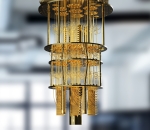
The quantum revolution in the healthcare industry
From ultra-fast quantum computers to highly sensitive sensors - quantum technologies could take medicine a giant step forward. Possible areas of application range from drug development and early cancer detection to reading brain waves to control prostheses or exoskeletons. The German state of Baden-Württemberg plays a key role in the development of sensors in particular.
https://www.gesundheitsindustrie-bw.de/en/article/dossier/The-quantum-revolution-in-the-healthcare-industry